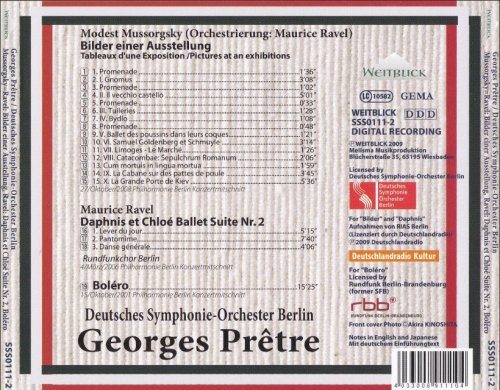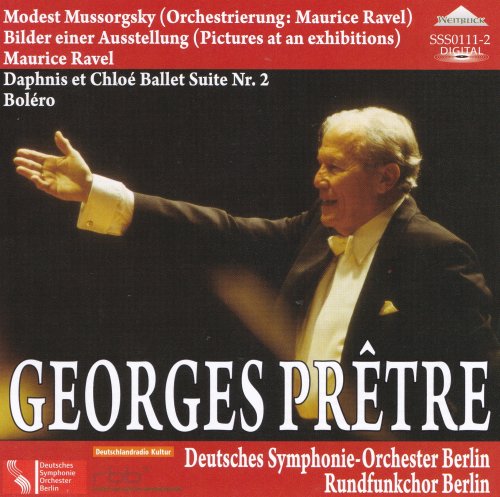
Georges Pretre & Deutsches Symphonie-Orchester Berlin - Modest Mussorgsky & Maurice Ravel (2009)
BAND/ARTIST: Georges Pretre, Deutsches Symphonie-Orchester Berlin
- Title: Modest Mussorgsky: Pictures at an exhibition & Maurice Ravel: Daphnis et Chloe Suite N°2; Bolero
- Year Of Release: 2009
- Label: Weitblick
- Genre: Classical
- Quality: FLAC (image + .cue, log, scans)
- Total Time: 67:49 min
- Total Size: 319 MB
- WebSite: Album Preview
Tracklist:
M.Mussorgsky - Les Tableaux d'une Exposition:
01] I. Promenade
02] II. Gnome
03] III. Promenade
04] IV. Le vieux chateau
05] V. Promenade
06] VI. Les tuileries
07] VII. Bydlo
08] VIII. Promenade
09] IX. Ballet des poussins dans leur coque
10] X. Samuel goldenberg et schmuyle
11] XI. Le marche de limoges
12] XII. Catacombe
13] XIII. Cum mortuis in lingua mortua
14] XIV. La cabane sur des pattes de poule
15] XV. La Grande Porte de Kiev
M.Ravel - Daphnis et Chloe Suite N°2:
16] I. Lever du jour
17] II. Pantomime
18] III. Danse generale
19] M.Ravel - Bolero

M.Mussorgsky - Les Tableaux d'une Exposition:
01] I. Promenade
02] II. Gnome
03] III. Promenade
04] IV. Le vieux chateau
05] V. Promenade
06] VI. Les tuileries
07] VII. Bydlo
08] VIII. Promenade
09] IX. Ballet des poussins dans leur coque
10] X. Samuel goldenberg et schmuyle
11] XI. Le marche de limoges
12] XII. Catacombe
13] XIII. Cum mortuis in lingua mortua
14] XIV. La cabane sur des pattes de poule
15] XV. La Grande Porte de Kiev
M.Ravel - Daphnis et Chloe Suite N°2:
16] I. Lever du jour
17] II. Pantomime
18] III. Danse generale
19] M.Ravel - Bolero

Georges Prêtre was one of the leading conductors of the last half of the 20th century, especially known for operatic conducting and performances of French music. He studied trumpet as a boy, graduating from the Douai Conservatory. Nazi occupation of Paris did not substantially interfere with the teaching activities of the famous Paris Conservatory, where Prêtre continued his musical studies. He took first prize in trumpet in 1944 and studied harmony with Henri Challan and Maurice Duruflé. He began studying conducting with André Cluytens, Pierre Dervaux, and Richard Blareau. His conducting debut was in operetta, a fact that eluded biographers since he used the assumed name of Georges Dherain.
His official conducting debut was at the Marseilles Opera in 1946, in Lalo's Le Roi d'Ys. He spent a decade primarily in provincial French opera houses: Marseilles (1946-1948), Lille (1948), Casablanca (1949-1951), and Toulouse (1951-1955). He was appointed music director of the Opéra-Comique in Paris in 1956, debuting with Richard Strauss' Capriccio and conducting a wide variety of repertory there. He made his American conducting debut at the Chicago Lyric Opera in 1958. By 1960, he had become well-known and was selected by composer Francis Poulenc, who selected Prêtre to conduct the premiere of Le voix humaine (1959) and was highly esteemed for his performances of Poulenc's full-length opera Dialogues de Carmelites. He also led the premiere of the Sept répons des ténèbres (1963).
In 1959, he joined the staff of the Paris Opéra, becoming music director in 1966. He debuted at the Royal Opera House, Covent Garden (1961), the Metropolitan Opera in New York (1965), and La Scala (1965). During this period he became a conductor often requested by opera superstar Maria Callas. He frequently returned to the Met and La Scala, especially known for his French repertory.
His concert conducting career also advanced during this period. Over the years he conducted most of the important orchestras of Europe and America, and in 1962 was appointed deputy director of the Royal Philharmonic Orchestra. In 1971, the Paris Opéra's periodic political problems erupted into a huge backstage dispute that closed the Opéra for several months, during which Prêtre left the company.
Since that painful experience, Prêtre most frequently worked outside of France. He became principal guest conductor of the Vienna Symphony Orchestra in 1986, holding that post through 1991, when he was named one of its honorary conductors for life. In 1995, he became artistic director and principal conductor of the Stuttgart Radio Symphony Orchestra. Among his world premieres were Symphony No. 4 by Marcel Landowski (1988) and Concerto for 15 Soloists and Orchestra by Françaix (1990).
In 1999, he conducted a major series of concerts in Paris in honor of the 100th anniversary of Poulenc's birth. -- Joseph Stevenson
His official conducting debut was at the Marseilles Opera in 1946, in Lalo's Le Roi d'Ys. He spent a decade primarily in provincial French opera houses: Marseilles (1946-1948), Lille (1948), Casablanca (1949-1951), and Toulouse (1951-1955). He was appointed music director of the Opéra-Comique in Paris in 1956, debuting with Richard Strauss' Capriccio and conducting a wide variety of repertory there. He made his American conducting debut at the Chicago Lyric Opera in 1958. By 1960, he had become well-known and was selected by composer Francis Poulenc, who selected Prêtre to conduct the premiere of Le voix humaine (1959) and was highly esteemed for his performances of Poulenc's full-length opera Dialogues de Carmelites. He also led the premiere of the Sept répons des ténèbres (1963).
In 1959, he joined the staff of the Paris Opéra, becoming music director in 1966. He debuted at the Royal Opera House, Covent Garden (1961), the Metropolitan Opera in New York (1965), and La Scala (1965). During this period he became a conductor often requested by opera superstar Maria Callas. He frequently returned to the Met and La Scala, especially known for his French repertory.
His concert conducting career also advanced during this period. Over the years he conducted most of the important orchestras of Europe and America, and in 1962 was appointed deputy director of the Royal Philharmonic Orchestra. In 1971, the Paris Opéra's periodic political problems erupted into a huge backstage dispute that closed the Opéra for several months, during which Prêtre left the company.
Since that painful experience, Prêtre most frequently worked outside of France. He became principal guest conductor of the Vienna Symphony Orchestra in 1986, holding that post through 1991, when he was named one of its honorary conductors for life. In 1995, he became artistic director and principal conductor of the Stuttgart Radio Symphony Orchestra. Among his world premieres were Symphony No. 4 by Marcel Landowski (1988) and Concerto for 15 Soloists and Orchestra by Françaix (1990).
In 1999, he conducted a major series of concerts in Paris in honor of the 100th anniversary of Poulenc's birth. -- Joseph Stevenson
Classical | FLAC / APE | CD-Rip
As a ISRA.CLOUD's PREMIUM member you will have the following benefits:
- Unlimited high speed downloads
- Download directly without waiting time
- Unlimited parallel downloads
- Support for download accelerators
- No advertising
- Resume broken downloads


